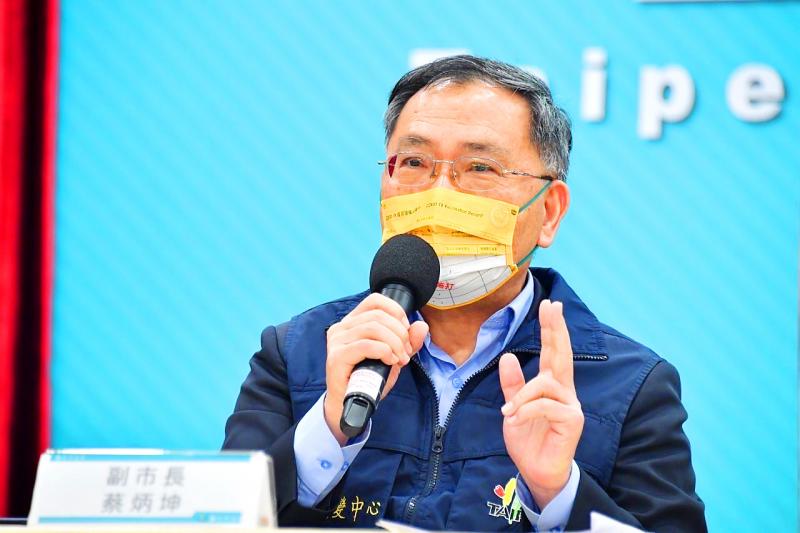Taipei Deputy Mayor Tsai Ping-kun (蔡炳坤) was admitted to an intensive care unit after surgery for a hemorrhagic stroke, Taipei City Hospital said yesterday.
Tsai arrived at an emergency room in an ambulance at 7:49pm on Monday, said Lin Chih-lin (林志陵), deputy superintendent of the hospital’s Renai branch, adding that Tsai was unconscious and had high blood pressure when he arrived.
“We performed an emergency computed tomography scan on his brain and other examinations, which found massive bleeding on the right side of the brain and midline shift,” Lin said.

Photo courtesy of the Taipei City Government
An emergency craniotomy was performed to remove blood clots, an external ventricular drain was inserted to monitor intracranial pressure, after which Tsai was admitted to an intensive care unit for further treatment and observation, Lin said.
The hospital has established a medical team to take care of Tsai, whose vital signs were stable yesterday, he said, adding that as Tsai continues to receive sedative treatment, the upcoming week is a critical observation period.
The team would continue to monitor the deputy mayor’s condition, he said.
Lin Wen-hsiung (林文雄), a neurosurgeon at the hospital, said that the surgery took about one-and-a-half hours and Tsai was in a deep coma.
Taipei Mayor Ko Wen-je (柯文哲) on Monday said that he was at a dinner event with Tsai and Taichung city councilors at a hotel in Taipei when Tsai suddenly fell at about 7:20pm.
He gave instructions to call an ambulance, assessing that Tsai had likely had a stroke, said Ko, who is a doctor.
Taipei Deputy Mayor Vivian Huang (黃珊珊) — who is expected to run for mayor this year with Ko nearing the end of his second term — was asked by reporters yesterday whether Tsai’s condition would affect the city’s administration.
She said that there are capable people to maintain city government operations, so there is no immediate concern regarding administrative matters.
Earlier on Facebook she wrote that Tsai spends long hours in his role for the city and expressed hope that they would be able to work together again soon.

Alain Robert, known as the "French Spider-Man," praised Alex Honnold as exceptionally well-prepared after the US climber completed a free solo ascent of Taipei 101 yesterday. Robert said Honnold's ascent of the 508m-tall skyscraper in just more than one-and-a-half hours without using safety ropes or equipment was a remarkable achievement. "This is my life," he said in an interview conducted in French, adding that he liked the feeling of being "on the edge of danger." The 63-year-old Frenchman climbed Taipei 101 using ropes in December 2004, taking about four hours to reach the top. On a one-to-10 scale of difficulty, Robert said Taipei 101

Nipah virus infection is to be officially listed as a category 5 notifiable infectious disease in Taiwan in March, while clinical treatment guidelines are being formulated, the Centers for Disease Control (CDC) said yesterday. With Nipah infections being reported in other countries and considering its relatively high fatality rate, the centers on Jan. 16 announced that it would be listed as a notifiable infectious disease to bolster the nation’s systematic early warning system and increase public awareness, the CDC said. Bangladesh reported four fatal cases last year in separate districts, with three linked to raw date palm sap consumption, CDC Epidemic Intelligence

Two Taiwanese prosecutors were questioned by Chinese security personnel at their hotel during a trip to China’s Henan Province this month, the Mainland Affairs Council (MAC) said yesterday. The officers had personal information on the prosecutors, including “when they were assigned to their posts, their work locations and job titles,” MAC Deputy Minister and spokesman Liang Wen-chieh (梁文傑) said. On top of asking about their agencies and positions, the officers also questioned the prosecutors about the Cross-Strait Joint Crime-Fighting and Judicial Mutual Assistance Agreement, a pact that serves as the framework for Taiwan-China cooperation on combating crime and providing judicial assistance, Liang

US climber Alex Honnold left Taiwan this morning a day after completing a free-solo ascent of Taipei 101, a feat that drew cheers from onlookers and gained widespread international attention. Honnold yesterday scaled the 101-story skyscraper without a rope or safety harness. The climb — the highest urban free-solo ascent ever attempted — took just more than 90 minutes and was streamed live on Netflix. It was covered by major international news outlets including CNN, the New York Times, the Guardian and the Wall Street Journal. As Honnold prepared to leave Taiwan today, he attracted a crowd when he and his wife, Sanni,